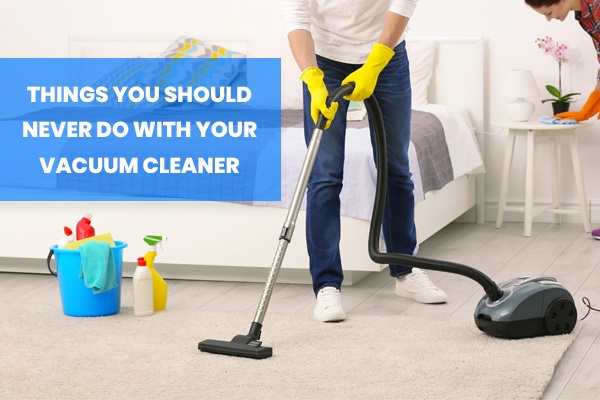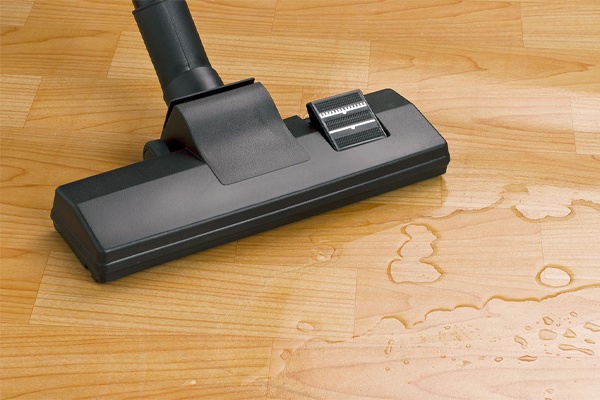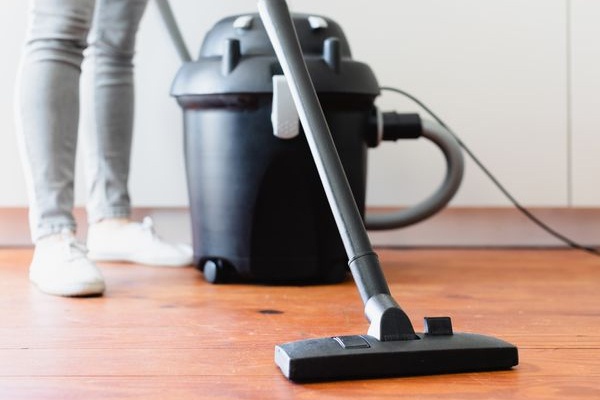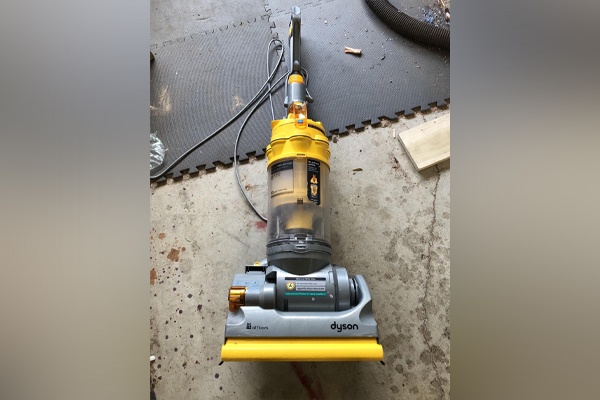Vacuum cleaners have become an integral part of our lives. They are the quickest solutions to cleaning up your space as they extract fine dust from every nook and corner. But there are certain things that you should never do with your vacuum cleaner.
Vacuum cleaners come with specific instructions, and it is vital to check the booklet before you run them. No matter what kind of vacuum cleaner you use, you need to avoid a few essential things to make sure the machine does not get damaged or harm you. Well, let’s find out about the things you should never do with your vacuum cleaner!
6 Things You Should Never Do With Your Vacuum Cleaner
Vacuuming Liquids
It is vital to understand that regular vacuum cleaners are never meant to soak water. The machine can get affected, and vacuuming water can also cause electrical failure. If the water seeps into the motor, it could cause short circuits and ruin the entire machine.
In case the machine does not get affected, it’s still a hassle to clean up the dirt. The entire dust collector might get wet and can turn the machine glitchy.
Shop vacuums that are meant for wet and dry cleaning purposes. They are specially designed to handle both water and dry dirt. They are called wet-dry vacuums and are comparatively cheaper. They come in handy to clean up spilled liquid, makeup spill, wet coffee grounds, and fireplace ash faster when you have small kids around.
Vacuuming Hard Objects
It is common to find broken glass pieces, tiny metal chunks, screws, wet paper towels, or stones on the floor. Often vacuum users simply run the machine over such objects instead of picking them up.
Although it seems unlikely, these tiny objects can be a hindrance to the machine. They might get stuck in the loops or the engine and are difficult to remove. Even tiny stones and pennies can damage the machine, get stuck in the dustpan and brush or the motor. The best way to avoid this is to pick up such particles manually and set them aside.
Using the Vacuum Over the Cord
Vacuum cleaner cords are usually sturdy and durable. They can withstand high amounts of friction and heat. But running over them with an electric brush is a bad idea. The bristles of the electric brush can be really sharp to clean up corners. They can scratch the surface of the cords and damage them.
If the mouth of the vacuum cleaner is bigger, the cords might get sucked in. This is a rare possibility, but the cable can get tangled inside and cause trouble. Cords that have poor exteriors can easily snap if the electrical brush runs over them. Broken cords can weaken the machine and electrocute users. So avoid running your vacuum over cords to stay safe.
Using it When Overfilled
Vacuum cleaners must be cleaned once they reach their capacity. If you don’t clean up an overfilled vacuum cleaner, there are high chances of overheating and short-circuits. It is essential to check the vacuum bag before starting your next cleaning session.
Vacuuming dirt becomes easier with the empty bag. The suction is much stronger than a full vacuum bag. Regular vacuum bag cleaning reduces stress on the motor and increases the easy flow of air for suction. Once the motor has lesser stress, there is improved performance and lasts long. Look for bagged vacuum cleaners with more capacity and longer cleaning sessions.
Assuming Motor is Broken
Did your vacuum cleaner suddenly stop in the middle of a cleaning session? Does it turn off often? Is the suction slow and ineffective? Do you feel the machine is lagging and dragging? Most of the time, you might assume the motor is broken or the engine is old and ends up buying a new vacuum cleaner.
But in most cases, that’s not true. It could just be that the engines or mortars are overheated, or the dust bag is completely full. The machines also have a time-out. Continuous use of vacuum cleaners can weaken their performance. It is important to give a few minutes of break from overheating and to clean up the dust bag regularly.
At times, your machine might stop if hair or fibers are locked up in the cleaning brush. If it is still troublesome, open the vacuum cleaner and look for clogs. After you clean it, let it cool down and then switch it on.
Most of the latest vacuum cleaners have an automatic turn-off feature that shuts down the machine if it overheats. Some old models have a manual turn-off. Always check the instructions to reset or turn the device back on.
To avoid sudden shutdowns, it is vital to check the machine before use and run it in intervals. If the problems still exist, well, it might be time for a new vacuum cleaner!
Throwing it Away Earlier
If your machine isn’t picking up dirt as it used to and you think it’s damaged, it might not be true. Regular maintenance is an important factor in keeping your vacuum running for a long time.
Always check the dirtbag and look for mildew growth. Many vacuum cleaners have poor suction if they are full or almost full. Clean up the dirtbag and make sure the hoses are correctly connected as per the instructions given in the manual.
If emptying the dirtbag does not work, you might just have a clogged machine. Most vacuum cleaners can be opened. Open your machine and look for any blockages or hard pieces stuck inside. Make sure you unplug your machine before opening it.
Never vacuum up liquids. They can harm the cleaner. Sometimes, the brush rolls get stuck and tangled. Check if the fibers or the brush bristles are blocking the pipe. These are a few easy solutions to bring your vacuum cleaner back to life.
Conclusion
Vacuum cleaners play an essential role in keeping homes clean and dust-free by sucking in fine particles from every corner. Most vacuum cleaners can clean dry dirt, while the latest ones can pick up both wet and dry dirt. Even though vacuum cleaners are meant to clean, you cannot run them over anything and everything.
As listed above, there are many things you should never do with your vacuum cleaner to ensure the long life of your machine. Maintaining it regularly, however, can do wonders and make the engines run for years on end.






Leave a Reply